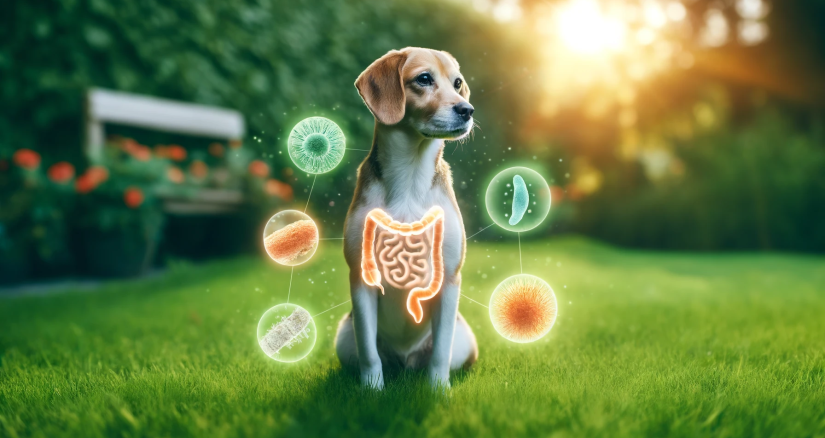
Taking Care of Your Pet's Microbiome: The Gut-to-Mouth Connection
A pet might not tell us when their tummy troubles occur, but taking consistent care of their gut health is important for their overall well-being. Like humans, pets have a microbiome, a complex community of tiny organisms in their intestines. This microbiome plays a vital role in digestion, immunity, and even mood! And guess what? The health of a pet's mouth is linked to its gut health too!
The microbiome is essentially a mini-ecosystem within the body. It's made up of trillions of microbes, mostly bacteria, but also including fungi and viruses. These tiny organisms live in different parts of the body, with the gut being a particularly important one for pets.
Think of it like a zoo for microscopic creatures! These little residents play a big role in the pet's health. A healthy microbiome is crucial for a dog's overall health and well-being. It contributes to a strong immune system, proper digestion, nutrient absorption, and mental health.1
The Gut-to-Mouth Connection
The bacteria in a pet's gut can travel up to its mouth. An unhealthy gut microbiome can lead to oral problems like bad breath, gum disease, and tooth loss. On the other hand, a healthy gut microbiome can help keep a pet's mouth healthy.
Keeping Your Pet's Microbiome Happy
So, how to keep a pet's gut microbiome thriving? Here are a few tips:
- Feed them a healthy diet: A balanced diet with plenty of fiber is essential for good gut health.5 Fiber can help bulk up stool and keep things moving smoothly through the digestive system. Fiber can be found in foods like whole grains, fruits, and vegetables.
- Probiotics: Probiotics are live bacteria that can help replenish the good bacteria in the gut. Probiotics can also be useful after a course of antibiotics, an episode of diarrhea, or other digestive upset by replacing good bacteria. These can be found in some pet foods and as supplements.
- Prebiotics: Prebiotics are like food for the good bacteria in the gut. They help stimulate the growth of beneficial bacteria, which can overcrowd harmful bacteria, keeping the gut in balance. Some good sources of prebiotics are chicory root/inulin, and oligosaccharides (may have seen them as “FOS” or “MOS” on the ingredient deck).
- Regular dental care: Just like for humans, brushing a pet's teeth regularly is essential for good oral health. This will help remove plaque and bacteria that can contribute to gut problems. The oral-gut microbiome axis can translocate to the gut and is bidirectional; thus, any disruption to either’s microbiome balance can negatively impact the other.6
Signs of an Unhealthy Microbiome
Here are some signs that a pet's microbiome might be out of whack:
- Digestive issues like diarrhea, constipation, or vomiting – these are all signs of a gut imbalance. Diarrhea can mean trouble digesting food, inflammation in the intestines, or an overgrowth of bacteria. Constipation could be a sign that the pet is having difficulty breaking down food, or an issue with moving waste through the digestive tract. Vomiting can also be seen with a gut imbalance.
- Bad breath – an overgrowth of bacteria can cause bad breath. The cause can be used to characterize bad breath, there have been five primary causes identified, and type 3, is related to the gastrointestinal tract.4
- Skin problems – Skin issues such as itchiness, redness, hot spots, and even excessive shedding can be signs of a gut imbalance. When the gut bacteria are imbalanced, this can lead to allergens and toxins entering the bloodstream and creating an inflammatory response.2,3
Other potential signs of an imbalanced gut microbiome are changes in appetite, weight loss or gain, and a weakened immune system. It is important to remember that these can also be caused by underlying health problems, but if these signs are noticed, talk to a veterinarian. They can help diagnose the problem and recommend a treatment plan. Ensuring formulation by experts, especially those well-educated in feeding the gut microbes. Taking care of a pet's gut health is not just helping their tummy – it is helping their whole body stay happy and healthy!
References
- Suchodolski, J.S. 2022. Analysis of the gut microbiome in dogs and cats. Vet. Clin. Pathol. 50(Suppl. 1):6-17.
- Craig, J.M. 2016. Atopic dermatitis and the intestinal microbiota in humans and dogs. Vet. Med. Sci. 2:95-105.
- Rostaher, A., Morsy, Y., Favrot, C., Unterer, S. Schnyder, M., Scharl, M., Fischer, N.M. 2022. Comparison of the gut microbiome between atopic and healthy dogs – Preliminary data. Anim. 12:2377.
- Di Cerbo, A., Pezzuto, F., Canello, S., Guidetti, G., Palmieri, B. 2015. Therapeutic effectiveness of a dietary supplement for management of halitosis in dogs. J. Vis. Exp. 101:52717.
- Middelbos, I.M., Vester Boler, B.M., Qu, A., White, B.A., Swanson, K.S., Fahey, G.C. 2010. Phylogenetic characterization of fecal microbial communities of dogs fed diets with or without supplemental dietary fiber using 454 pyrosequencing. PLoS ONE. 5(3): e9768. doi:10.1371/journal.pone.0009768
- Park, S.Y., Hwang, B.O., Lim, M., Ok, S.H., Lee, S.K., Chun, K.S., Park, K.K., Hu, Y., Chung, W.Y., Song, N.Y. 2021. Oral-gut microbiome axis in gastrointestinal disease and cancer. Cancers. 13(9):2124.
Follow us on LinkedIn for the latest updates on all things happening here at BSM Partners.
About the Author
Dr. Stephanie Clark is a board-certified companion animal nutritionist, veterinary nurse and nutrition specialist, a pet owner, and a mother who had a baby during the formula shortage. She has spent the past almost two decades dedicating her career to the welfare of pets, livestock, and wildlife. She currently provides nutritional consultations for veterinary clinics and works in the pet food industry.
This content is the property of BSM Partners. Reproduction or retransmission or repurposing of any portion of this content is expressly prohibited without the approval of BSM Partners and is governed by the terms and conditions explained here.